Index relies entirely on the support of donors and readers to do its work.
Help us keep amplifying censored voices today.
Beginning today, nominations for the Index on Censorship Freedom of Expression Awards 2016 are open. Now in their 16th year, the awards have honoured some of the world’s most remarkable free expression heroes – from Israeli conductor Daniel Barenboim to Syrian cartoonist Ali Farzat to education activist Malala Yousafzai.
The awards shine a spotlight on individuals fighting to speak out in the most dangerous and difficult of conditions.
Index invites the public, NGOs and media organisations to nominate anyone they believe deserves to be part of this impressive peer group: a hall of fame of some of those at the forefront of tackling censorship worldwide.
There are four categories in Index on Censorship’s Freedom of Expression Awards:
• Arts for artists and arts producers whose work challenges repression and injustice and celebrates artistic free expression.
• Campaigning for activists and campaigners who have had a marked impact in fighting censorship and promoting freedom of expression.
• Digital Activism for innovative uses of technology to circumvent censorship and enable free and independent exchange of information.
• Journalism for courageous, high impact and determined journalism that exposes censorship and threats to free expression.
Winners will be flown to London for the gala ceremony, which will take place at The Unicorn Theatre in London on 13 April 2016. In 2015, the ceremony was hosted by comedian Shappi Khorsandi, with awards presented by judges and special guests including Martha Lane Fox, Mariane Pearl, Elif Shafak and Keir Starmer.
Winners also become awards fellows and receive support to amplify their work for free expression. As fellows, winners become part of a world-class network of campaigners, activists and artists sharing best practice on tackling censorship threats internationally.
Jodie Ginsberg, CEO of Index, said: “The Freedom of Expression Awards turn up the volume on the censored and silenced. I encourage everyone, no matter where they are in the world, to nominate a free expression hero so their voices can be heard.”
The 2016 awards shortlist will be announced in late January 2016.
Judges in 2016 will include Nobel prize-winning Nigerian poet and playwright Wole Soyinka; Kirsty Brimelow QC, a human rights barrister and chair of The Bar Human Rights Committee of England and Wales; and classical pianist James Rhodes, whose memoir Instrumental was published earlier this year after the UK Supreme Court overturned a publication ban.
Rhodes said: “The Russian poet Yevgeny Yevtushenko once wrote: ‘When truth is replaced by silence, the silence is a lie’ – and to honour those who fight to speak out and break that silence is a privilege. Having experienced first hand the terrifying impact of censorship, I’m thrilled to be able to play a small part in acknowledging the bravery of those who continue to express themselves in the face of unimaginable oppression.”
For more information on the awards, please contact [email protected] or call +44 (0)207 260 2660.
Is Islam “satanic”?
Personally, I don’t believe Satan, or God, exist, so it’s not a question I give a great deal of time to.
Salman Rushdie gave it some thought. The title of The Satanic Verses comes from an old idea that there may have been parts of the Sura that were false. Specifically, a concession to the polytheism of the pre-Islamic Meccans to whom Muhammad preached: “And see ye not Lat and Ozza, And Manat the third besides? These are exalted Females, And verily their intercession is to be hoped for.”
Muhammad was, the story goes, tricked into saying these lines by Satan. The Angel Gabriel later told Muhammad he had been deceived, and he recanted.
For Thought-For-The-Day types, it’s a nice little “don’t believe everything you read” lesson. For literary types, it may even be seen as an interesting early example of an unreliable narrator. Muhammad trusted the angel to tell him the truth: but at that moment, the angel was not who he seemed.
I sincerely doubt Northern Ireland’s Pastor James McConnell has much truck with the idea of unreliable narration. Or even fiction, for that matter. McConnell is the type of person who believes that if someone is going to go to the trouble of writing a thing down in a book, then that thing should be true.
A book? No. The Book. There is one book for the pastor. It’s called the Bible, and it’s got everything you need. You might read other books, but they’ll be books about the Book. Books explaining in great detail just how great the Book is. What there are not, cannot be, are other the Books.
So the Bible can be true, or the Quran can be true: but they can’t both be true. And if the Quran is false, but Islam claims it is true, then Islam must be wicked. Satanic, even.
In May last year, Pastor McConnell, like many of his ilk, was very exercised by the story of Meriam Yehya Ibrahim, who had reputedly been sentenced to death in Sudan after converting from Islam to Christianity. Here was further proof, septuagenarian McConnell preached to the congregation at Whitewell Metropolitan Tabernacle, that “Islam is heathen, Islam is satanic, Islam is a doctrine spawned in hell.” There may be good Muslims in the UK, he said, but he didn’t trust them. Enoch Powell was right, McConnell said, to predict “rivers of blood”.
McConnell seemed to know this was going to get him in trouble. “The time will come in this land and in this nation,” he preambled, “to say such things will be an offence to the law.”
Turns out, the pastor was half-right at least in this much. Last week, Northern Irish prosecutors announced that McConnell would face prosecution for his sermon. For inciting religious hatred? No, too obvious. McConnell, now retired and said to be in declining health, will be prosecuted under Section 127 of the Communications Act.
Section 127 is, free-speech nerds may recall, the piece of legislation that pertains to the sending “by means of a public electronic communications network a message or other matter that is grossly offensive or of an indecent, obscene or menacing character”.
It’s the one that led to the Paul Chambers “Twitter Joke Trial” case, one of the great rallying points of online free speech in recent years. In January 2010 Chambers joked online that he would blow up Doncaster Robin Hood airport if his flight to Belfast (always Belfast!) to meet his girlfriend was cancelled. He was convicted, even though every single person involved in the case acknowledged that he had been joking, including the airport security, who did not for one second treat the tweet seriously, even as a hoax.
Chambers was convicted. Eventually, in June 2012, the conviction was quashed. Questions were raised about why then-Director of Public Prosecutions Keir Starmer had persisted in pursuing the case. For his part, Starmer launched a consultation to draft guidelines on when the Communications Act provisions should and should not be used (this writer took part in the meetings and submitted written evidence).
During that process, Starmer was fond of pointing out (correctly) that the Communications Act had been designed to protect telephone operators from heavy breathers. It had nothing to do with stupid jokes on the internet.
And it certainly had nothing at all to do with the online streaming of sermons by fundamentalist preachers.
Let there be no doubt: the prosecution of James McConnell under the Communications Act is a disgrace and a travesty. It is the action of a prosecution service more interested in appearing to be liberal than upholding justice and rights. If McConnell is suspected of being guilty of incitement, then prosecute him under that law. But the deployment of the catch-all Communications Act, in a situation it was very obviously not designed for, suggests prosecutors were not confident of that case and have instead reached for the vaguest charge possible.
When one combines this latest prosecution with the recent “gay cake” case, in which a Christian bakery in County Antrim was fined for refusing to decorate a cake with a pro-equal marriage message, it’s hard not to think the people of Protestant Ulster may, on this occasion, have some real fuel for the siege mentality that’s kept them going for so very long. It feels as if an attempt is being made to force liberalisation on Christians through the courts. It’s hard to imagine any outcome besides resentment, and Lord knows the “wee province” has enough of that already.
This column was published on 25 June 2015 at indexoncensorship.org
A Kenyan woman speaking out for women in one of the world’s most dangerous regions and a female journalist who exposed an unreported uprising in Saudi Arabia are among the winners of this year’s Index on Censorship Freedom of Expression Awards.
“Our shortlisted nominees are all tackling direct and serious threats to stifle free speech,” said Index on Censorship CEO Jodie Ginsberg. “We were humbled and inspired by their stories, and their dedication to ensuring we can all speak freely.”
The awards were presented at a ceremony at The Barbican, London, hosted by comedian Shappi Khorsandi whose father Hadi was forced into exile from Iran because of his satirical writing.
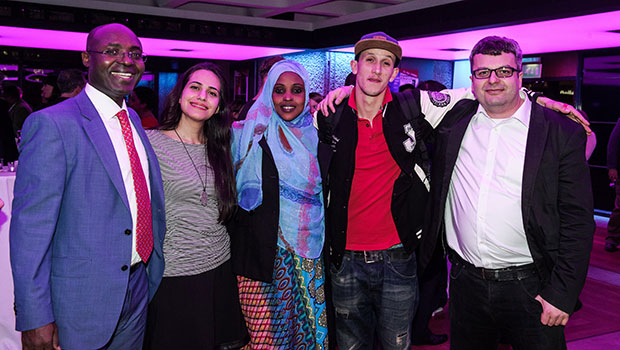
Index on Censorship 2015 Freedom of Expression award winners: Rafael Marques de Morais (journalism), Safa Al Ahmad (journalism), Amran Abdundi (campaigning), Mouad “El Haqed” Belghouat (arts) and Tamas Bodoky (digital activism) (Photo: Alex Brenner for Index on Censorship)
Awards are presented in four categories: journalism, arts, campaigning and digital activism. The winners were Saudi journalist Safa Al Ahmad and Angolan reporter Rafael Marques de Morais (journalism – jointly awarded); Moroccan rapper “El Haqed” (arts); Kenyan women’s rights campaigner Amran Abdundi (campaigning); and Hungarian freedom of information website Atlatszo (digital activism).
The crime of free expression
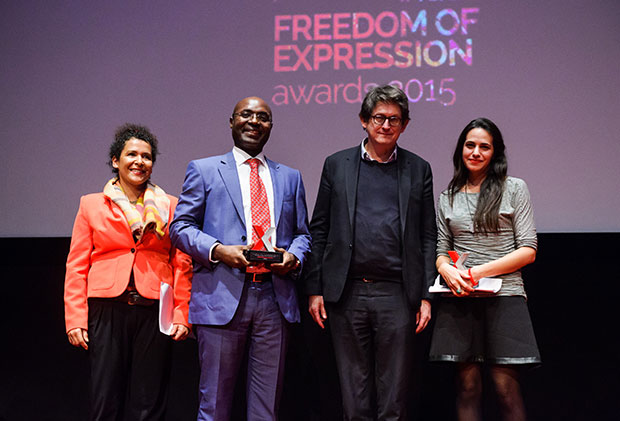
Journalist and campaigner Mariane Pearl, journalism award recipient Rafael Marques de Morais, Guardian editor Alan Rusbridger and journalism award recipient Safa Al Ahmad (Photo: Alex Brenner for Index on Censorship)
Al Ahmad was recognised for her documentary Saudi’s Secret Uprising, which exposed details of an unreported mass demonstration in Saudi Arabia. “Safa Al Ahmad dared to go into places that are difficult for women and for reporters, to bring that information back and share it with the world,” said Turkish author Elif Shafak, one of the five judges. Saudi Arabia is a mystery, even to its own people, said Al Ahmad in her acceptance speech: “Parts of our history is deliberately concealed, the present is muddled with rumours and half-truths. The government-owned and controlled media play a major role in the dissemination of those false realities of ourselves and others. This makes facts a precious commodity in Saudi Arabia.”
Angolan investigative reporter Marques de Morais has been repeatedly prosecuted for his work exposing government and industry corruption and will go on trial on 24 March charged with defamation. “Rafael is a very important individual doing very important work in a very, very difficult environment,” said judge Sir Keir Starmer QC. Marques de Morais dedicated his speech to the Zone 9 group of Ethiopian bloggers currently in jail “for the crime of exercising their right to freedom of expression”.
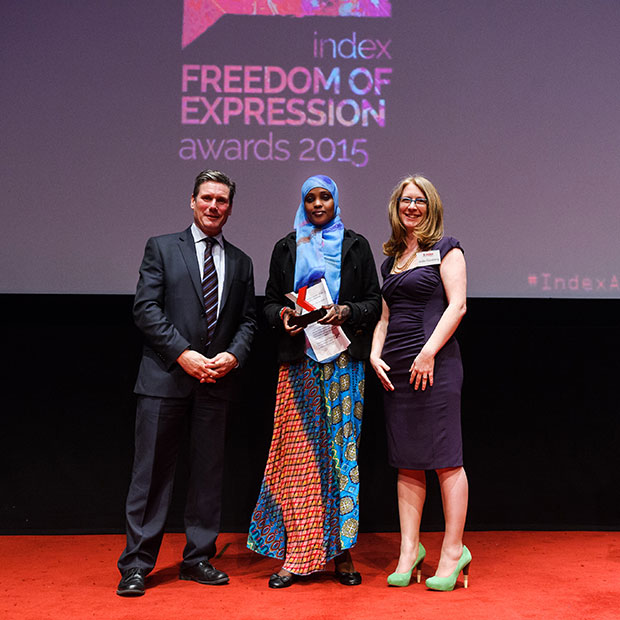
Doughty Street barrister Keir Starmer, campaigning award recipient Amran Abdundi and Index on Censorship CEO Jodie Ginsberg (Photo: Alex Brenner for Index on Censorship)
The winner in the campaigning category, Amran Abdundi, is a women’s rights activist based in north-eastern Kenya and runs a group helping women along the dangerous border with Somalia, where terrorism and extremist violence dominate. Judge Martha Lane Fox said: “Amran Abdundi was a standout candidate for me. She is doing something incredibly powerful in an unbelievably complicated and dangerous situation.” Abdundi dedicated her award to the “marginalised women of northern Kenya… who will now know that their struggles and their efforts to fight for their rights are being recognised internationally”.
Help us let the world know the truth
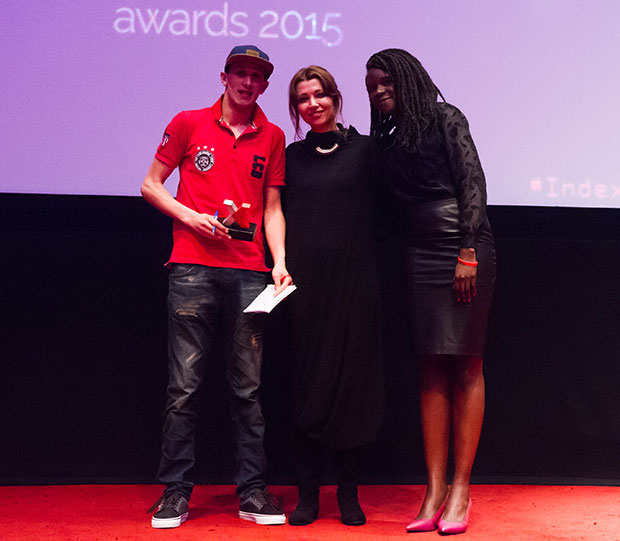
Arts category winner Mouad “El Haqed” Belghouat, novelist Elif Shafak and actor Stella Odunlami (Photo: Alex Brenner for Index on Censorship)
Arts category winner Mouad “El Haqed” Belghouat is a Moroccan rapper and human rights activist whose music highlights widespread poverty and endemic government corruption in Morocco. He has been imprisoned on spurious charges three times in as many years, most recently in 2014. Belghouat said in his acceptance speech: “I have been through difficult times: I was jailed, fired from my work, rejected by many friends. I am still forbidden to sing in my own country. But after all that I am still determined that I will never change my position. I will fight for freedom, equality and human rights for ever.” Lane Fox said Belghouat had taken his music and “translated it into a kind of online activism, but then, crucially, mobilised people in the street”.
The digital award, decided by public vote, went to Hungarian investigative news outlet Atlatszo.hu managed by Tamás Bodoky. The website acts as watchdog to a Hungarian government which has increasingly tightened its grip on press freedom in the country. Editor-in-chief Bodoky said Atlatszo.hu called on all those who believe that independent journalism in Hungary is under threat. “All those who agree that politics and business interests have sunk their claws into everyday life. All those who know that taxpayer money is vanishing. We are calling on you to help us let the world know the truth.”
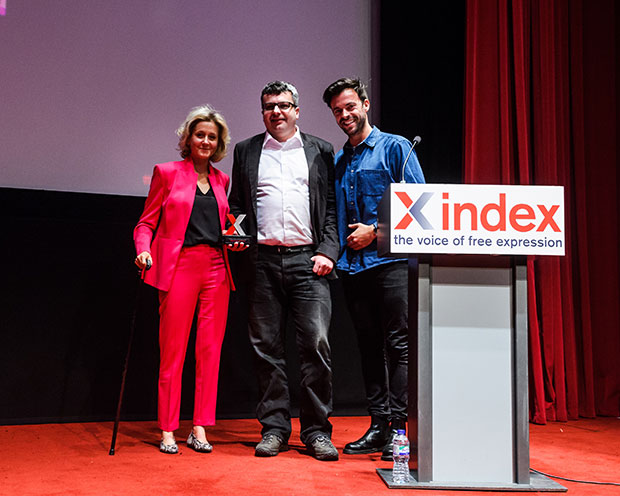
Entrepreneur Martha Lane Fox, digital activism award recipient Tamas Bodoky and actor Jolyon Rubinstein (Photo: Alex Brenner for Index on Censorship)
The awards were presented by the judges along with special guests including Guardian editor Alan Rusbridger.
A special award was also given on the evening to honour the many Azerbaijani journalists and activists jailed or forced into exile or hiding following a recent crackdown by the government. Former award winner and journalist Idrak Abbasov, who was forced to flee Azerbaijan last year, accepted the award on behalf of all those facing persecution in the country. “I call upon the world community to help Azerbaijan… so that our colleagues might be released and that our country might become a normal state in which we and others might live freely,” Abbasov told the audience in a video speech.
The evening featured an exhibition of specially commissioned cartoons by international cartoonists, reflecting on the past 12 months for free expression. Most of the artists had direct experience of persecution over their work, including Syrian political cartoonist Ali Ferzat – a former Index award winner – and Malaysia’s Zunar. “In the wake of the attacks on Charlie Hebdo, we wanted to pay homage to the work of cartoonists who are so often the first to face censorship in any move to stifle free expression,” said Index’s Jodie Ginsberg.
Related
• Safa Al Ahmad: Facts are a precious commodity in Saudi Arabia
• Rafael Marques de Morais: I believe in the power of solidarity
• Amran Abdundi: This award is for the marginalised women of northern Kenya
• El Haqed: I will fight for freedom, equality and human rights for ever
• Tamas Bodoky: The independence of journalism in Hungary is under threat
• Special Index Freedom of Expression Award given to persecuted Azerbaijani activists and journalists
• Video: Comedian Shappi Khorsandi hosts Index on Censorship awards
• Drawing pressure: Cartoonists react to threats to free speech
An earlier version of this article stated that Rafael Marques de Morais will go on trial on 23 March. The date is 24 March.
This article was posted on 18 March 2015 at indexoncensorship.org
Keir Starmer’s new guidelines aim to minimise controversial criminal cases against Twitter and Facebook users. But will they work, asks Padraig Reidy

(more…)